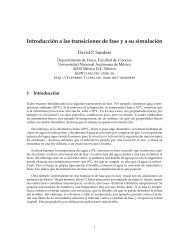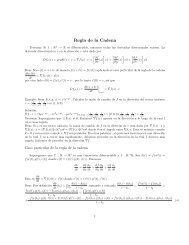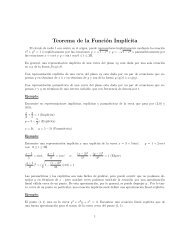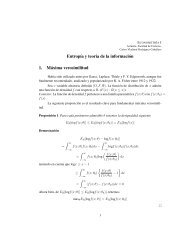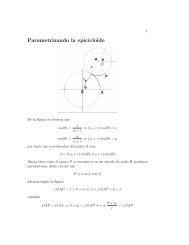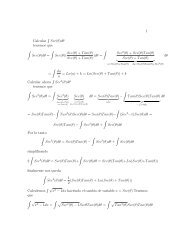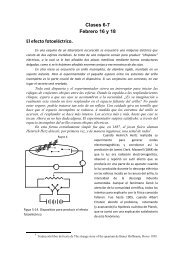"Surely You're Joking, Mr. Feynman!" - unam.
"Surely You're Joking, Mr. Feynman!" - unam.
"Surely You're Joking, Mr. Feynman!" - unam.
Create successful ePaper yourself
Turn your PDF publications into a flip-book with our unique Google optimized e-Paper software.
I've very often made mistakes in my physics by thinking the theory isn't as good<br />
as it really is, thinking that there are lots of complications that are going to spoil it an<br />
attitude that anything can happen, in spite of what you're pretty sure should happen.<br />
A Different Box of Tools<br />
At the Princeton graduate school, the physics department and the math department<br />
shared a common lounge, and every day at four o'clock we would have tea. It was a way<br />
of relaxing in the afternoon, in addition to imitating an English college. People would sit<br />
around playing Go, or discussing theorems. In those days topology was the big thing.<br />
I still remember a guy sitting on the couch, thinking very hard, and another guy<br />
standing in front of him, saying, "And therefore suchandsuch is true."<br />
"Why is that?" the guy on the couch asks.<br />
"It's trivial! It's trivial!" the standing guy says, and he rapidly reels off a series of<br />
logical steps: "First you assume thusandso, then we have Kerchoff's thisandthat; then<br />
there's Waffenstoffer's Theorem, and we substitute this and construct that. Now you put<br />
the vector which goes around here and then thusandso. . ." The guy on the couch is<br />
struggling to understand all this stuff, which goes on at high speed for about fifteen<br />
minutes!<br />
Finally the standing guy comes out the other end, and the guy on the couch says,<br />
"Yeah, yeah. It's trivial."<br />
We physicists were laughing, trying to figure them out. We decided that "trivial"<br />
means "proved." So we joked with the mathematicians: "We have a new theorem that<br />
mathematicians can prove only trivial theorems, because every theorem that's proved is<br />
trivial."<br />
The mathematicians didn't like that theorem, and I teased them about it. I said<br />
there are never any surprises that the mathematicians only prove things that are<br />
obvious. Topology was not at all obvious to the mathematicians. There were all kinds of<br />
weird possibilities that were "counterintuitive." Then I got an idea. I challenged them: "I<br />
bet there isn't a single theorem that you can tell me what the assumptions are and what<br />
the theorem is in terms I can understand where I can't tell you right away whether it's<br />
true or false."<br />
It often went like this: They would explain to me, "You've got an orange, OK?<br />
Now you cut the orange into a finite number of pieces, put it back together, and it's as big<br />
as the sun. True or false?"<br />
"No holes?"<br />
"No holes."<br />
"Impossible! There ain't no such a thing."<br />
"Ha! We got him! Everybody gather around! It's Soandso's theorem of<br />
immeasurable measure!"<br />
Just when they think they've got me, I remind them, "But you said an orange! You<br />
can't cut the orange peel any thinner than the atoms."<br />
"But we have the condition of continuity: We can keep on cutting!"<br />
"No, you said an orange, so I assumed that you meant a real orange."<br />
So I always won. If I guessed it right, great. If I guessed it wrong, there was



